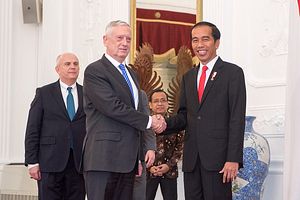On February 28, the United States and Indonesia finally held a ceremony to commemorate the completed delivery of F-16 fighter jets to the Southeast Asian state. Though the development is no doubt significant given the importance of the initial deal for bilateral ties, it nonetheless masks the continued challenges that remain for the two countries including in the defense realm.
As I have noted before in these pages, the United States and Indonesia have long shared a defense relationship, and that has continued to broaden over the years with some previous restrictions eased as well. U.S. policymakers across administrations have recognized that for all the limitations inherent in the U.S.-Indonesia relationship, Jakarta is nonetheless a significant actor in Southeast Asia and an important partner in addressing a wide range of security challenges. That pattern has continued on with U.S. President Donald Trump, as evidenced by several developments including U.S. Defense Secretary Jim Mattis’ visit to Indonesia in January (See: “The New US-Indonesia Strategic Partnership: Problems and Prospects”).
One of the elements of the U.S.-Indonesia defense relationship is military equipment, and a tangible example of that was the expected delivery of used F-16 fighter jets from the United States to Indonesia. An initial deal was struck in 2011 under the Obama administration, and though it was merely one of many that occurred under the Excess Defense Articles (EDA) program, it was nonetheless significant because it marked the largest transfer of defense articles in the history of U.S.-Indonesia ties and was expected to boost Indonesia’s own efforts to modernize its air force (See: “Can Indonesia Speed Up its Air Force Modernization?”).
Though the process of regenerating and transferring the F-16 aircraft to Indonesia was always going to take some time, it has also taken much more time than both sides would like and has not been free of controversy as Jakarta also considers other options as well for its air force modernization needs. All the aircraft were supposed to finally arrive by the end of last year, but some of them had encountered delays which had prevented the official completion of the delivery in its entirety. That has real implications for Indonesia, with officials themselves admitting that it badly needs more aircraft to cover its vast airspace and manage a range of security challenges.
On February 28, the Indonesian Air Force (TNI-AU) finally held a ceremony where it officially received 24 F-16 fighter jets from the United States. As expected, the handover ceremony was held at the TNI-AU base in Iswahjudi, Madiun and witnessed by U.S. and Indonesian officials including Defense Minister Ryamizard Ryacudu and U.S. Ambassador to Indonesia Joseph Donovan Jr.
Ryacudu’s remarks at the ceremony cast the delivery of the F-16s as important for the country’s development of its capabilities but also emphasized the need for proper maintenance and operation of the aircraft to optimize its utility including through proper training and usage. The Indonesian defense ministry said that, as expected, 16 of the aircraft would be stationed at Squadron 16 at the Roesmin Nurjadin Air Force base in Pekanbaru, Riau, while the remaining eight aircraft would be stationed at Squadron 3 at Iswahjudi.
Donovan, for his part, congratulated the TNI and called the move a sign that the strategic partnership between the two countries “is getting stronger and growing.” Though the move no doubt represents a boost for defense ties given the significance of the deal itself, as I noted before, the attention to individual advances in defense ties also mask broader uncertainties that continue to remain about the future of U.S.-Indonesia relations under Trump as well as Indonesia’s own (See: “What’s Next for US-Indonesia Defense Relations Under Trump?”).
































